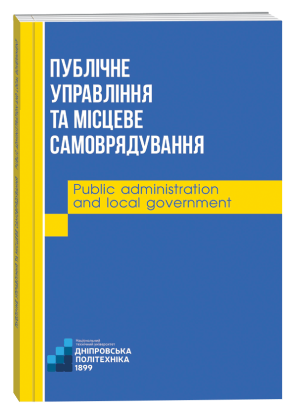THE SYSTEM OF ANTI-CORRUPTION MEASURES IN THE CONTEXT OF IMPROVING THE EFFICIENCY OF LAW ENFORCEMENT ACTIVITIES AND COMBATING COLLABORATION IN PUBLIC ADMINISTRATION
DOI:
https://doi.org/10.32782/2414-4436/2024-1-2Keywords:
anti-corruption measures, efficiency, law enforcement, collaborationism, public administration, strengths, weaknesses, opportunities, threats, international experienceAbstract
Topicality. The article examines anti-corruption measures as an important element of modern state administration, aimed at preventing, detecting and stopping corrupt actions in all spheres of society. These measures cover a wide range of strategies, policies, laws and mechanisms, including the creation of effective control mechanisms, strengthening the legal framework, developing ethical standards and raising public awareness. In modern state administration, there is a serious problem of corruption and collaborationism, which endangers the effectiveness of law enforcement and citizens' trust in state structures. Despite existing anti-corruption measures, there are factors such as political pressure, insufficient qualification of law enforcement officers, low level of coordination between authorities and limited resources that make it difficult to fight against these negative phenomena Goal. The purpose of the article is to identify effective anti-corruption strategies and measures aimed at increasing the effectiveness of law enforcement and countering collaborationism in the context of public administration. The results. It was found that the effectiveness of law enforcement activities is a key aspect of the fight against corruption, requiring professionalism and independence from political or other influences. Anti-collaborationism is also important, as it aims to stop the illegal cooperation of officials or employees of public institutions with corrupt groups or organizations. In addition, public administration acts as an organizational system covering all aspects of the management of a country or region, including the legislative, executive and judicial authorities, and determines the directions and mechanisms for the implementation of anti-corruption measures. Modern research in the field of public administration and the fight against corruption emphasizes the importance and complexity of tasks related to the prevention of corruption and collaborationism. For an effective analysis of these problems, it is important to identify the strengths and weaknesses, opportunities and threats of anti-corruption measures. The following analysis, which helps to structure and systematize information, is highlighted in the table. Among the strengths are the high qualification and ethics of law enforcement officers, the independence and objectivity of their work, as well as effective cooperation between authorities. However, weaknesses include the lack of qualifications and ethics of some law enforcement officers, political pressure on law enforcement, and lack of coordination and resources. Opportunities include the introduction of public awareness programs, improved control technologies, and international cooperation, while threats may arise from political coups, international corruption, and opposition from corrupt groups. Such an analysis helps to identify key directions for improving the effectiveness of anti-corruption measures and public administration.
References
Бобровська О. Сучасний стан інвестиційної безпеки України в умовах Covid-19 та її вплив на фінансово-економічну ситуацію держави. Financial and Credit Activity Problems of Theory and Practice, 1(36), 233–242. https://doi.org/10.18371/fcaptp.v1i36.227770
Брус Т. М., Ковальов В. Г. Проблеми реалізації антикорупційної політики в Україні. Державне управління: удосконалення та розвиток. № 3, 2016 р. URL: http://www.dy.nayka.com.ua/?op=1&z=954
Гулак О. В., Курило В. І., Дубчак Л. М. До питання про шляхи подолання корупції в Україні. Право та державне управління. № 1, 2021 р. С. 196-201 URL: http://pdu-journal.kpu.zp.ua/archive/1_2021/31.pdf
Інвестиційний менеджмент: навчальний посібник. / Л. Докієнко та ін. Київ : Академвидав, 2011. 408 с.
Камардіна Ю. В., Філіпенко А. С. Антикорупційні програми органів місцевого самоврядування як організаційно-правові засоби протидії корупції. Право. № 23–24, 2022 р. URL: https://visnyk-pravo.mdu.in.ua/ARHIV-uk/23-24/8.pdf
Кирюха К. І. Напрями підвищення ефективності адміністративно-правового регулювання запобігання корупції в органах національної поліції України. Право. № 73, 2022 р. С. 32–37 URL: https://visnykjuris-uzhnu.com/wp-content/uploads/2022/11/7-1.pdf
Клименко В., Акімова Л, Докієнко Л. Фінансовий ринок : навчальний посібник. Київ : «Центр учбової літератури», 2015, 358 с.
Пархоменко-Куцевіл О. І. Сучасні підходи до проблем реформування антикорупційних державних органів в Україні. Вчені записки Університету “КРОК”. № 2, 2019 р. С. 85–93.
Акімова Л., Акімов О. Протидія корупції: правове регулювання і практичний досвід : тези доп. Міжнар. наук.-практ. конф. (м. Вінниця, 28 жовт. 2022 р.) МВС України, Харків. нац. ун-т внут. справ, Наук. парк “Наука та безпека”. Харків : ХНУВС, 2022 р. 232 с.
Чернєй В. В., Гусарєв С. Д., Чернявський С. С. Реалізація державної антикорупційної політики в міжнародному вимірі : матеріали ІV Міжнар. наук.-практ. конф. (Київ, 12 груд. 2019 р.) : у 2 ч. Київ : Нац. акад. внутр. справ, 2019 р. Ч. 1. 264 с.
Kryshtanovych M., Akimova L., Shamrayeva V., Karpa M., Akimov O. Problems of European integration in the construction of EU security policy in the context of counter-terrorism. International Journal of Safety and Security Engineering. 2022. Vol. 12, No. 4. pp. 501–506. https://doi.org/10.18280/ijsse.120411
Marchenko A., Akimova L., Akimov O. The current state of ensuring the effectiveness of coordination of anticorruption reform. Alta: Journal of interdisciplinary research, 2021. Vol. 11, Issue 2, Special issue XX, 78–83.






